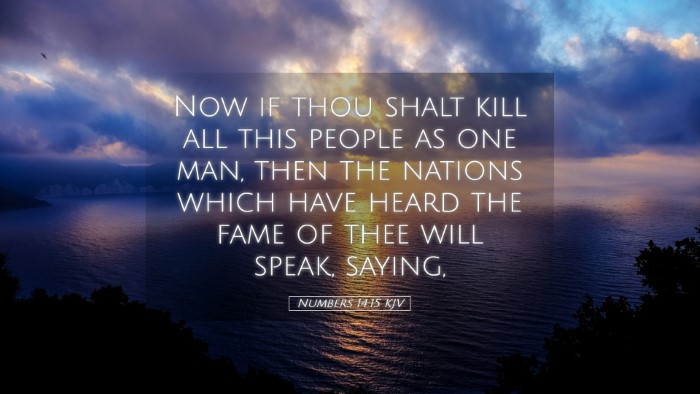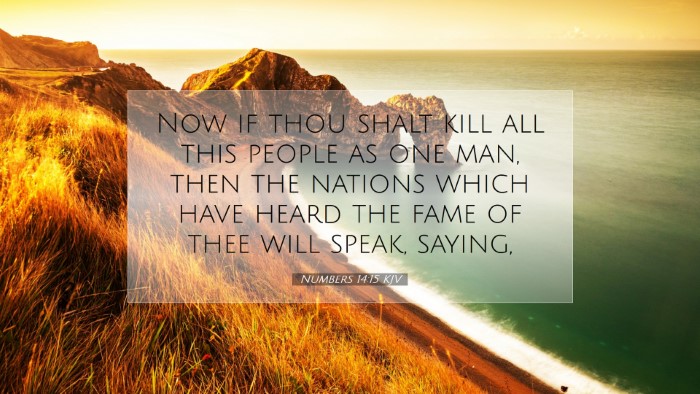Commentary on Numbers 14:15
Bible Verse: "Now if Thou shalt kill all this people as one man, then the nations which have heard the fame of Thee will speak, saying,"
Contextual Analysis
Numbers 14 is a pivotal chapter in the narrative of the Israelites' journey through the wilderness. Following the report of the spies, a spirit of rebellion arose among the people. They expressed their desire to return to Egypt rather than possess the land promised to them by God. In response to this defiance, Moses intercedes, pleading for God to show mercy.
Moses' Intercessory Prayer
Matthew Henry comments on Moses' plea, highlighting his concern for God's reputation among the nations. Moses appeals to God's character, urging Him to consider the consequences of His actions. If God were to destroy the people, it would provide grounds for the surrounding nations to question His integrity and power.
Albert Barnes elaborates on the idea of divine reputation. He emphasizes that Moses recognized the potential implications of such judgment. The reputation of Yahweh among heathen nations was at stake; hence, Moses implores God to act in a manner consistent with His nature as a merciful and forgiving deity.
Theological Implications
The verse raises significant theological questions regarding divine justice and mercy. Adam Clarke notes that Moses' argument demonstrates a deep understanding of God's attributes. It is a reminder of the balance between justice and mercy that often permeates Scripture. In essence, God’s actions can serve a dual purpose: administering judgment on sin while still upholding His covenant faithfulness.
This dialogue between Moses and God also serves as a model for intercessory prayer, illustrating the importance of advocacy in times of crisis. Clarke emphasizes that true intercession involves not merely asking for mercy but articulating the deepest grounds for such pleas—in this case, the glory of God.
The Role of Israel's Identity
Moses' prayer also touches on the identity of Israel as God's chosen people. Matthew Henry points out that Moses reminds God, in his intercession, that Israel is set apart and that their fate reflects on God’s covenant relationship with them. The destruction of Israel would not only deter God's people but also damage the faith of those who do not know Him.
The concept of 'being a light to the nations' permeates the discussion, offering a broader view of God’s plan. As Albert Barnes notes, Israel was called to exemplify the holiness of God, and their preservation and blessing would be a testament to His glory among the Gentiles.
Concluding Reflections
In conclusion, Numbers 14:15 is more than just a plea for mercy; it encapsulates a rich discourse on God’s glory, human intercession, and the ethical responsibilities of His people. Adam Clarke rightly asserts that the essence of Moses' arguments lies in their focus on God's honor and the moral implications of divine wrath. As students of Scripture, theologians, and pastors reflect on this text, they are reminded of the importance of advocating for others and upholding the name of God in all circumstances.
Ultimately, the plea serves as a profound reminder that our intercessions should be grounded in a desire for God’s glory, recognizing that our communal identity as believers is intrinsically tied to our reflection of God's mercy and righteousness in a world that desperately needs both.


